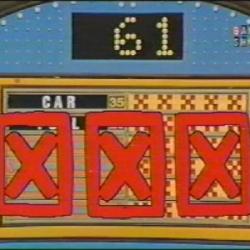Yesterday I posted the first ten verses of Galatians 2. Galatians is probably the Pauliest of Paul’s epistles in the New Testament, and I think this passage is the Pauliest part of Galatians, making it the Pauliest thing in all of Paul.
The little subtitle in the NRSV labels this section “Paul and the Other Apostles,” but that barely gives a hint of what’s going on here. What’s at stake is the status of “the uncircumcised” — the unclean outsiders that Paul has been converting and championing within the Christian community that is still at this point so very newborn that nobody has yet thought to call it a “church.” Paul’s unqualified welcoming of these uncircumcised and his advocacy for their fully equal status has been causing concern among some of those “other apostles,” and Paul is losing his patience with them.
As usual when Paul loses his patience, he starts by reminding everyone how patient he has been up until that point. “After 14 years I went up again,” he writes, and it’s clear he’s not prepared to let another 14 years, or 14 days, go by without getting things resolved.
He brings Barnabas along to play good cop, and he brings Titus with him, too. This is important because Titus is one of those unclean, uncircumcised outsiders whose status has been such a “controversial issue” within the very young not-yet-a-church. Paul is bringing Titus because he knows Titus is his brother, not a controversy or an issue or an abstraction. So if any of those other apostles are going to have anything to say about Titus, they’re going to have to say it to his face.
What they’ve been saying about Titus and about people like him was all undeniably scriptural. The texts on circumcision are not ambiguous and they are too numerous to count. The Bible is eminently clear. It says that people like Titus cannot convert unless they are circumcised and pledge to follow the rules. Paul says no to that. He says people like Titus are his brothers and sisters, his full equals. Paul isn’t just contradicting a handful of obscure clobber-texts, he’s swimming against a powerful main current of scripture.
At this point, Paul has lost all patience with the clobber-texters weaponizing scripture against people like his brother Titus. He dismisses them as “false believers secretly brought in … to spy on the freedom we have in Christ Jesus, so that they might enslave us.” Fourteen years ago, maybe, Paul might have regarded their scriptural objections as good-faith concerns, but not any more. He has since concluded that their abstract arguments are nothing more than a bad-faith power grab, and as far as he’s concerned they’ve earned his dismissive contempt: “We did not submit to them even for a moment. … And from those who were supposed to be acknowledged leaders (what they actually were makes no difference to me; God shows no partiality) — those leaders contributed nothing to me.”
Phew.
Paul does acknowledge the legitimacy and contribution of some leaders, and he lays out his argument for them, inviting them — or maybe daring them — to find any fault with it. He submits his argument for full equality to “James and Cephas and John” and they “recognized the grace that had been given to me.” Paul says he “laid before them … the gospel that I proclaim among the Gentiles, in order to make sure that I was not running, or had not run, in vain.” And they agreed it was not in vain. They agreed that this gospel was true — the same gospel they had learned directly from Jesus. And “Titus … was not compelled to be circumcised, though he was a Greek.”
Galatians is probably the earliest book in the New Testament. It was written long before the Gospels provided a longer, more detailed account of Jesus’ apostles. In a sense, this is where the New Testament characters of Peter, James, and John are first introduced. The first thing we see them doing, then, is (eventually) affirming Paul’s welcome of the unclean outsiders and affirming his argument that this is what Jesus’ gospel means.
For “Paul and the Other Apostles,” then, that gospel trumps all the clobber-texts that might be marshaled by false believers who seek to control and enslave. That’s what Paul is saying here. That’s pretty much what Paul is saying everywhere.
The parabolic arc here is obvious, but let’s state it directly as a straight line: This dispute in Galatians 2 precisely parallels the current dispute within what we now call the “church” over the unqualified welcome and full equality of LGBT+ Christians.
This is the gospel that we must proclaim, and it is not in vain. Even Titus, who is with us, is not compelled to stop being queer. Those who would make the status of our LGBT+ kin conditional on their “circumcision” are denying the grace that was given to Paul. They are denying the gospel that Paul preached, denying the freedom that we have in Christ, so that they might enslave us.
This denial of Paul’s gospel comes from those who are supposed to be acknowledged leaders, but what they actually are makes no difference to me, they have contributed nothing to me.
I admit those are harsh words. But those are not my words.












